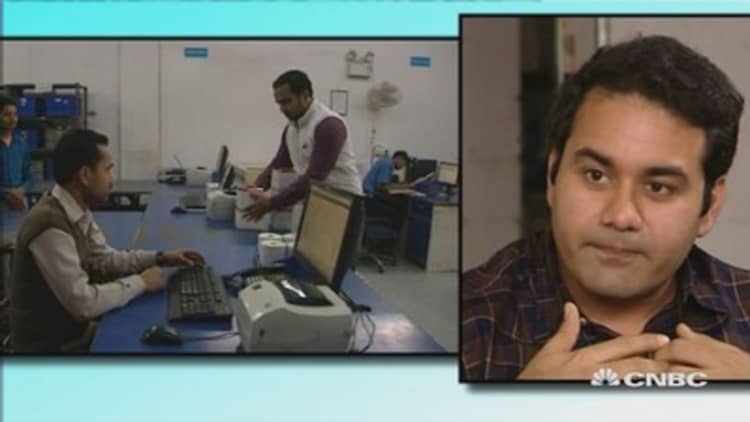
Talking to Kunal Bahl and Rohit Bansal, the two schoolmates who founded Indian online marketplace Snapdeal, it's crystal clear who their biggest business hero is.
"One of the biggest motivations for us was what Jack Ma was able to do with Alibaba in China. We realized that the ability to create quantum impact was so strong in the business model that he had picked, that if we were able to replicate anywhere close to what he had achieved in China, we would move the needle for India," said Bahl, who is also the site's chief executive.
The admiration may go both ways. According to recent media reports, Alibaba and Foxconn are in talks about investing in Snapdeal, which could value the company at $5 billion.
In an interview with Oriel Morrison for CNBC's Entrepreneur Asia: Power Players, Bahl said more than funding, Snapdeal would love to have an inside take on how Alibaba operates.
"I think the knowledge that they (Alibaba) provide us will be of great value. We'd love to get it directly," he said.
"We have a very long horizon in this business. I tell any incoming investor now, we have a 25-year view on our company, and you have to come in on at least five years. We don't know when is the right time for an IPO (initial public offering), and we don't want investors to get upset if an IPO doesn't happen in one, two or three years," Bahl added.
According to data compiled by Wall Street Journal, Snapdeal, which was founded in 2010, is now India's fourth most valuable startup, valued at $2 billion. Gross value of the goods sold on company's online marketplace is over $3 billion.
Mobile is a huge piece of Snapdeal's business, with more than 70 percent of the company's transactions happening on smartphones.
Read MoreMeeker bullish on India's Internet economy
"In smaller towns and cities in India, 90 percent of our transactions come from mobile. That's because most of them never had a PC, and for first time in their lives, with affordable smartphones, and the reach of the 3G network, that they're been able to access the internet. Mobile is the reason that internet is growing in India. And riding that wave is extremely important for our company," said Bansal, who as well as co-founding Snapdeal is also its chief operating officer.
But when asked when Snapdeal will likely start churning out profit, the two founders said they would like to get the key pieces right first.
"It's important to decide if you believe that e-commerce is going to be 20 times its present size in the next five years. If you do, then it's important to invest today to make that happen," said Bansal.
Read MoreIndia's star cricketer turns angel investor
"We feel that we've made a lot of progress. Over the next two to three years, we should be in the position where we can turn our profitability knob as well. But we don't want to be short-term greedy, we want to be long-term hungry. So it's important for us to not take shortsighted paths just to generate profits," said Bahl.
— For more on Kunal Bahl and Rohit Bansal's interview, tune in to Entrepreneur Asia: Power Players on CNBC. The episode will air on June 18, at 5:30pm SIN/HK, with repeats over the weekend.




